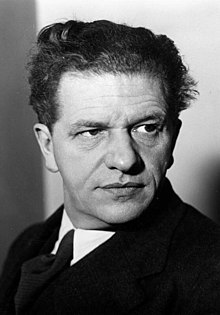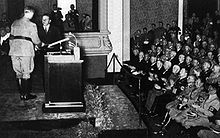Hanns Johst
Hanns Johst
Hanns Johst | |
|---|---|
 Johst in 1933 | |
| Born | 8 July 1890 Seerhausen bei Riesa, Kingdom of Saxony |
| Died | 23 November 1978 (aged 88) Ruhpolding, Bavaria, West Germany |
| Allegiance |
|
| Service/ | German Army in World War I and Waffen SS in World War II |
| Years of service | 1914–1918 and 1939–1945 |
| Rank | SS-Gruppenführer |
| Commands held |
|
| Battles/wars | |
| Awards | SS-Honour Ring |
Hanns Johst (8 July 1890 – 23 November 1978) was a German poet and playwright, directly aligned with National Socialist philosophy, as a member of the officially approved writers' organisations in the Third Reich. The statement "When I hear the word culture, I reach for my gun", variously misattributed to Heinrich Himmler, Joseph Goebbels and Hermann Göring, was in fact a corrupted version of a line in his play Schlageter.
Background[edit]
Hanns Johst was born in Seerhausen as the son of an elementary school teacher. He grew up in Oschatz and Leipzig. As a juvenile he planned to become a missionary. When he was 17 years old he worked as an auxiliary in a Bethel Institution. In 1910 he earned his Abitur in Leipzig and then started studying medicine and philosophy and—later—history of art. He volunteered for the army in 1914. In 1918 he settled down in Allmannshausen (part of Berg) at the Starnberger See.
Early work[edit]
His early work is influenced by Expressionism. Examples include Der Anfang (The Beginning) (1917) and Der König (The King) (1920). Later, he turned to a naturalist philosophy in plays such as Wechsler und Händler (Money changers and Traders) (1923) and Thomas Paine (1927).
Bertolt Brecht's first play Baal was written in response to Johst's play Der Einsame (The Lonely), a dramatization of the life of playwright Christian Dietrich Grabbe. In 1928 Johst joined Alfred Rosenberg's "Kampfbund für deutsche Kultur" (Militant League for German Culture) designed to combat Jewish influence in German culture. In 1932 he joined the National Socialist German Workers Party, explaining his agreement with Hitler's ideology in the essay "Standpunkt und Fortschritt" ("Standpoint and Progress") in 1933.
Schlageter[edit]
When the Nazis achieved power in 1933, Johst wrote the play Schlageter, an expression of Nazi ideology which was performed on Hitler's 44th birthday, 20 April 1933, to celebrate his victory. It was a heroic biography of the proto-Nazi martyr Albert Leo Schlageter. The famous line "When I hear the word culture, I reach for my gun", often associated with Nazi leaders, derives from this play. The actual line in the play is, however, slightly different: "Wenn ich Kultur höre … entsichere ich meinen Browning!" "When I hear 'Culture'... I release the safety catch on my Browning!" (Act 1, Scene 1). It is spoken by another character in conversation with the young Schlageter. In the scene Schlageter and his wartime comrade Friedrich Thiemann are studying for a college examination, but then start debating whether it is worthwhile doing so when the nation is not free. Thiemann argues that he would prefer to fight rather than study.
SCHLAGETER: Good old Fritz! (Laughing.) No paradise will entice you out of your barbed wire entanglement!
THIEMANN: That's for damned sure! Barbed wire is barbed wire! I know what I'm up against.... No rose without a thorn!... And the last thing I'll stand for is ideas to get the better of me! I know that rubbish from '18 ..., fraternity, equality, ..., freedom ..., beauty and dignity! You gotta use the right bait to hook 'em. And then, you're right in the middle of a parley and they say: Hands up! You're disarmed..., you republican voting swine!—No, let 'em keep their good distance with their whole ideological kettle of fish ... I shoot with live ammunition! When I hear the word culture ..., I release the safety on my Browning!"
SCHLAGETER: What a thing to say!
THIEMANN: It hits the mark! You can be sure of that.
SCHLAGETER: You've got a hair trigger.
— Hanns Johst's Nazi Drama Schlageter. Translated with an introduction by Ford B. Parkes-Perret. Akademischer Verlag Hans-Dieter Heinz, Stuttgart, 1984.
The line is frequently misattributed, sometimes to Hermann Göring and sometimes to Heinrich Himmler. In December 2007, historian David Starkey misattributed it to Joseph Goebbels in comments criticizing Queen Elizabeth II for being "poorly educated and philistine".[1] It has also been adapted by, for example Stephen Hawking as "When I hear of Schrödinger's cat, I reach for my pistol" and by filmmaker Jean-Luc Godard in his 1963 film Le Mépris, when a producer says to Fritz Lang: "Whenever I hear the word culture, I bring out my checkbook." Lang evokes the original line when he answers "Some years ago—some horrible years ago—the Nazis used to take out a pistol instead of a checkbook." Songwriter Clint Conley of Mission of Burma titled a song he wrote in 1981 "That's When I Reach for My Revolver".
Role in Nazi Germany[edit]

In 1933, Johst signed the Gelöbnis treuester Gefolgschaft, a declaration of loyalty to Hitler by pro-Nazi writers.[2] Succeeding Hans-Friedrich Blunck in 1935, Johst became the President of the Reichsschrifttumskammer (writer's union) and of the Deutsche Akademie für Dichtung (poetry academy), powerful organisations for German writers. In the same year the last prominent Jewish writers, e.g. Martin Buber, were expelled from the Reichsschrifttumskammer. By this time these organisations restricted membership to writers whose work was either explicitly pro-Nazi or at least approved of by the Nazis as non-degenerate. Johst achieved other positions of importance within the Nazi state, and he was named in the Gottbegnadeten list of September 1944 as one of the Reich's most important artists. During the war he held various positions within the SS, which Thomas Mann stated was the reason that several charges of pedophilia and abuse of children were dropped against Johst in the winter of 1944.[2]
Quotations[edit]
God the Father Himself did weave the splendor
with starry light and rays of the sun.
They however pushed the wreath of thorns
down into His hair and head and blood.
I weave for the child
only meadow herbs and larkspur.
Please, God, spare it the cross and thorns!
(in the anthology "Mother")[3]
The harder this war is becoming and the longer it takes, the more do we experience the clear certainty of the true value of culture. The intellectual and spiritual forces reveal their solace, their splendor, and their grace. The outward life is constantly getting simpler and harder, burdened with the sacrifice of our time, but the inner life gets new, young and rich confirmation. Nothing can endanger this inner richness, on the contrary the more cruelly the outward world attacks spirit and soul, the more redeeming does the marvel of art prove to be."[4] (June 1943, in a speech about Robert Schumann)
Post-war[edit]
After the war, Johst was interned by the Allies. In 1949, he was tried for his activities and imprisoned for three and a half years. On his release he was unable to re-establish his career as a writer, being banned from writing for ten years. He was only able to publish poems, under the pseudonym "Odemar Oderich", for Die kluge Hausfrau, the magazine of the German supermarket chain Edeka.[5]
Works[edit]
Novels, stories, novellas[edit]
- Der Anfang, 1917 [The Beginning]
- Der Kreuzweg, 1921 [Stations of the Cross]
- Consuela, 1924
- Consuela. Aus dem Tagebuch einer Spitzbergenfahrt, 1925 [Consuela: Excerpts From a Diary About a Trip to Spitsbergen]
- So gehen sie hin, 1930 [So They Vanish]
- Die Begegnung, 1930 [The Encounter]
- Die Torheit einer Liebe, 1931 [The Foolishness of a Love]
- Ave Maria, 1932
- Mutter ohne Tod. Die Begegnung, 1933 [Mother Without Death (i.e. undying). The encounter]
- Maske und Gesicht, 1935 [Mask and Face]
- Erzählungen, 1944 [Stories]
- Gesegnete Vergänglichkeit, 1955 [Blessed Mortality]
Drama[edit]
- Stunde der Sterbenden, 1914 [Hour of the Dying]
- Strof, 1915
- Der junge Mensch, 1916 [The Young Person]
- Der Ausländer, 1916 [The Foreigner]
- Stroh, 1916 [Straw]
- Der Einsame, 1917 [The Lonely]
- Der König, 1920 [The King]
- Propheten, 1922 [Prophets]
- Wechsler und Händler, 1923 [Money Changers and Traders]
- Die fröhliche Stadt, 1925 [The Happy City]
- Der Herr Monsieur, 1926 [Mister Monsieur]
- Thomas Paine, 1927
- Schlageter, 1933
- Fritz Todt. Requiem, 1943
Poetry[edit]
- Wegwärts, 1916 [Way-Bound]
- Rolandruf, 1918 [Roland's Call]
- Mutter, 1921 [Mother]
- Lieder der Sehnsucht, 1924 [Songs of Longing]
- Briefe und Gedichte von einer Reise durch Italien und durch die Wüste, 1926 [Letters and Poems About a Journey Through Italy and the Desert]
- Die Straße. Gedichte und Gesänge, 1941. [The Road: Poems and Songs.]
- Im Tal der Sterne. Liebeslieder. Mutterlieder, 1943. [In the Valley of Stars: Love Songs, Mother-Songs]
Essays, speeches, propaganda articles et al.[edit]
- Dramatisches Schaffen, 1922 [Dramatic Creativity]
- Wissen und Gewissen, 1924 [Knowledge and Conscience]
- Ich glaube! Bekenntnisse, 1928 [I believe! Declarations of Faith]
- Meine Erde heißt Deutschland, 1938 [My World is Called Germany]
- Ruf des Reiches, Echo des Volkes, 1940 [Call of the Reich, Echo of the People]
- Hanns Johst spricht zu dir (Sammelausgabe), 1942 [Hanns Johst Talks to You. Combined edition]
References[edit]
- ^ Queen is poorly educated and philistine, says Starkey | UK news | The Guardian
- ^ a b 88 "writers", from Letters of Heinrich and Thomas Mann, 1900–1949, Volume 12 of Weimar and Now: German Cultural Criticism, University of California Press 1998 ISBN 0-520-07278-2, p. 367–8
- ^ Anthology: Mutter (i.e. Mother), Albert Langen, Munich, 1921, p. 27. Original in German "Gottvater selber flocht den Glanz / aus Sternenlicht und Sonnenschein. / Sie aber pressten den Dornenkranz / in Haar und Haupt und Blut hinein. / Ich winde dem Kinde / nur Wiesenkraut und Rittersporn / Bewahr' es Gott vor Kreuz und Dorn!"
- ^ Musik im Kriege, 1. Jg., Heft 3–4, Juni–Juli 1943. Original in German: "Je härter dieser Krieg wird, und je länger er dauert, mit um so klarerer Eindeutigkeit erleben wir die wahren Werte der Kultur. Die geistigen und seelischen Kräfte offenbaren ihren Trost, ihren Glanz und ihre Gnade. Das äußere Leben wird ständig einfacher, ständig härter belastet von dem Verzicht des Alltages, da erhält das innere Leben neue, junge, reiche Bestätigung. Der innere Besitz ist durch nichts zu gefährden, im Gegenteil, je roher und grausamer die äußere Welt sich gegen Geist und Seele aufstellen mögen, nur um so erlösender beweist sich das Wunder der Künste."
- ^ Ernst Klee: Das Kulturlexikon zum Dritten Reich, Fischer, Frankfurt am Main 2007, p.286
External links[edit]
- 1890 births
- 1978 deaths
- People from Meissen (district)
- People from the Kingdom of Saxony
- Nazi Party members
- Writers from Saxony
- German male dramatists and playwrights
- 20th-century German dramatists and playwrights
- 20th-century German male writers
- Militant League for German Culture members
- German military personnel of World War I
- Nazis who served in World War I
- SS-Gruppenführer
- Waffen-SS personnel
Comments
Post a Comment